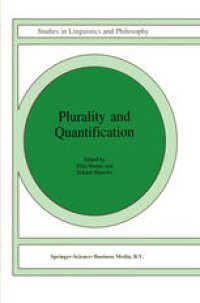
Ebook: Plurality and Quantification
- Tags: Semantics, Syntax, Philosophy of Language, Logic
- Series: Studies in Linguistics and Philosophy 69
- Year: 1998
- Publisher: Springer Netherlands
- Edition: 1
- Language: English
- pdf
The papers in this volume address central issues in the study of Plurality and Quantification from three different perspectives: • Algebraic approaches to Plurals and Quantification • Distributivity and Collectivity: Theoretical Foundations • Distributivity and Collectivity: Empirical Investigations Algebraic approaches to the semantics of natural languages were in dependently introduced for the study of generalized quantification, pred ication, intensionality, mass terms and plurality. The most prominent modern advocate for an algebraic theory of plurality (and mass terms) is certainly Godehard Link. It is indicative of the Wirkungsgeschichte of Link's work that most of the contributions in this volume take the logic of plurals proposed by Godehard Link (Link 1983, 1987) as their foundation or, at the very least, as their point of reference. Link's own paper in this volume provides a concise summary of many of the central research issues that have engaged semanticists during the last decade. Link's paper also contains an extensive bibliography that provides an excellent resource for scholars interested in the semantics of plurals. Since we can refer readers to Link's paper for an excellent survey of the subject matter of this book, we will limit our attention in this in troduction to summarizing the individual contributions in this volume. The book is organized into three main sections; within each section the papers are ordered alphabetically. However, as in much of linguistic the orizing, there is an exception: for reasons pointed out above, Godehard Link's article appears as Chapter 1.
The eight papers collected in Plurality and Quantification address three central issues in the study of plurality and quantification in natural languages. The first major theme regards algebraic approaches to plurals and quantification that have emerged as the leading paradigm for the study of these empirical phenomena over the last decade. The second main issue concerns the philosophical and mathematical foundations of concepts such as distributivity and collectivity. Finally, the authors address a broad range of empirical phenomena in Germanic and Romance languages, including the influence of Aktionsart on plural noun phrases, negative polarity, mass terms, plural quantification, and noun phrase conjunction.
Many of the papers shed new light on the question of how many readings have to be assigned to plural sentences and on the respective consequences for the architecture of the syntax-semantics interface.
Furthermore, most of the contributions contain insights which bear upon the study of the structure of universal grammar.
Audience:Plurality and Quantification will interest linguists, graduate students in semantics and syntax, philosophers of language and philosophical logicians interested in the semantics of natural language.